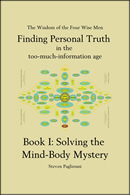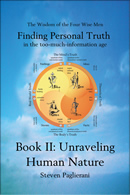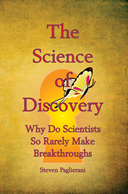
.png)
Excerpts from Solving the Mind Body Mystery (why do some pople lose their words?)
Can you forgive a bit of self-fluffery? Please forgive me if you can't. What I'm referring to is how I feel about that first thing I've included. Whenever I read that little essay, On Reinventing The Wheel, it still makes me smile. Given I've now published close to half a million words, it's saying a lot to say I still love it.
And the other bits I've included? Do I love them as well? Honestly I've chosen them more for the ideas than for my words. The idea that such a simple thing is behind our sense of success and failure, our taste in music, and what makes things feel intense? Well, that's a lot to take in.
Strangely, what I haven't mentioned here are the ideas this book mentions which are currently leading me to write next book.
.png)
On Reinventing the Wheel
Books such as this one often include things like sidebars and footnotes. I, myself, most times, find these side trips distracting at best and downright confusing at worst. At the same time, I do like reading more about the parts of a book I find interesting or confusing. Thus at the end of each chapter, you’ll find I’ve included what amount to footnotes, sidebars, notes I myself would have chosen to write in the margins, and references to further reading.
In part, I’ve chosen to do this as it mirrors what I do with books in my personal life. Thus despite my mother’s frequent admonishments to never deface a book by writing in it, I have come to love writing in the margins of books. I see this as my way to dialogue with the author of said book. More important, in the process, I get to treat myself as being equal to the author of said book, at least with regard to my ability to discern truth.
Am I always equal? As a human being, yes. I say this knowing others frequently know far more than I by virtue of their educations. At the same time, I believe no one learns truth from parroting another’s truth no matter how great the teacher. Thus despite the obvious virtues inherent in advising us to not reinvent the wheel, I believe this counsel misses the mark. By all means, feel free to retrace the steps of any teacher from which you may wish to learn. But do this step by step and include yourself in the process, only then comparing the teacher’s conclusions to your own.
What I’m saying is, human beings become wheel makers only by reinventing wheels. Failing this, at best, we become mere parrots of other people’s truth. Moreover, while I personally encourage you to seek whatever truth your heart desires, at the same time, I recommend you never take a teacher’s summary as the proof for a truth.
Worse yet is attempting to find the truth in a teacher’s words second hand. By this I mean, reading those dreadful analyses wherein a so-called expert bores us to tears by endlessly dissembling a teacher’s thoughts into mind-sized bites. In the end, this can only lead to misunderstandings and confusion, a lesson I learned the hard way only after years of trying to ingest these so called shortcuts to the truth.
For instance, I, for years, thought Freud a cold and arrogant prick. Then one day I realized I should at least try to read the prick in his own words. At which point, I naively drove to a bookstore thinking I’d just buy one of his books, never realizing my entire understanding would rest on the skill of the translator I chose. Freud wrote in German. I do not read German. Duh. Imagine my surprise then when I compared translations to see which would be most readable only to discover, to my dismay, that these translations often differed so greatly as to make Freud’s intent unknowable. They literally make Freud’s words appear to have been authored by different people. Which in truth, they were. It had just never occurred to me the degree to which these “auxiliary” authors can unintentionally obfuscate a source.
In the end, I fell in love with yet another man who risked all to put in writing his personal truth. More so when I later read a letter Freud wrote to a man who had originally been one of his greatest detractors, Fredrik Willem van Eeden, the originator of Lucid Dreaming. In this letter, Freud admits to van Eeden that he had based his book, Interpretation of Dreams, on his own life experiences. After which it seems van Eeden warmed to Freud, perhaps much like we warm to similarly brave souls.
My point is, please don’t take anyone’s word for what is true. Doing this means you’ll miss the chance to discover your own personal truth. This includes the truths of both translators of famous teachers and aspiring wise men like me. Thus I encourage you to take the time to reinvent what I’m saying in your own words. Only then can you hope to discover what is true for you. Including that it might just turn out that I am not a cold arrogant prick either. One can only hope.
How Time Affects Our Sense of Success and Failure
For many of us, success and failure seems to depend on how well we analyze the past. However, not all people feel this way. Thus while mind first people tend to rate success and failure based on past performance, body first people tend to see success and failure as more of a measure of how you’re doing in the present.
I mention this as it highlights a good way to identify people’s mind-body orientation. And their default sense of time. To wit, to mind first folks, life has a past, present, and future. But to body first folks, life occurs only in the present. Thus if you’re mind first, you’ll experience each success and failure in complex time. Whereas if you’re body first, you’ll experience each success and failure in simple time.
What does this mean?
If you’re a mind first person, you’ll tend to analyze your successes or failures, then assign them to categories. Thus mind first people focus more on frequency—how often these events happen. But if you’re a body first person, each success or failure will feel like it’s the only success or failure you’ve had. Thus body first people focus more on how intense each event is.
This difference—frequency or intensity—gives you a good way to know whether you’re experiencing simple time or complex time. When you make a decision based on how intense something feels, it’s likely you’re experiencing simple time—the body’s sense of time. But when you make a decision based on how often something happens, it’s likely you’re experiencing complex time—the mind’s sense of time.
Why Single Events Feel Intense
Does this intensity thing sound counterintuitive? It is. You’d think that experiencing multiple events would feel more intense, not less. However, were you to recall a time wherein you felt something intensely, say, a time when your little angel dropped a glass of milk on a newly waxed kitchen floor, you’d find that in those moments, it didn’t matter whether it was the first time or the fiftieth time. All you felt was, “NOT AGAIN!”
If you were to then plan a camping trip, however, and needed to figure out how many glasses you’d need to bring, you might find it hard to focus on anything but frequency. Here, your primary concern would likely shift away from how bad it feels when your child drops a glass and onto how often your little earthly representative of Shiva does this.
How Your Mind Body State Affects Your Taste in Music
Yet one more way to get a feel for this difference is to compare the two ways we sense time to the bass and treble controls on a stereo. To wit, when you’re listening to music and your body is in charge, physically feeling the bass is what’s important. So you crank up the volume, especially the lows. But when you’re listening to music and your mind is in charge, hearing crystal clear highs is what’s important. So you listen at a lower volume so you can mentally notice more detail.
Not coincidentally, were you to pay attention to your sense of time in these two situations, you’d notice that the more you focus on the low frequencies, the more time seems to slow down, whereas the more you focus on the high frequencies, the faster time seems to pass. Here we see yet another nod to how the frequency of what we sense—in this case the frequency of the sound—determines which of our brains processes it.
Overall, the thing to see here is how we can use the two ways we sense time to create a series of simple tests wherein we can know which brain is in charge. And at this point, rather than put you through any more mind-deadening theory, let’s just try this on for size.
We’ll begin with a brief look at the test conditions—followed by some typical tests.
Books by Steven Paglierani



.png)